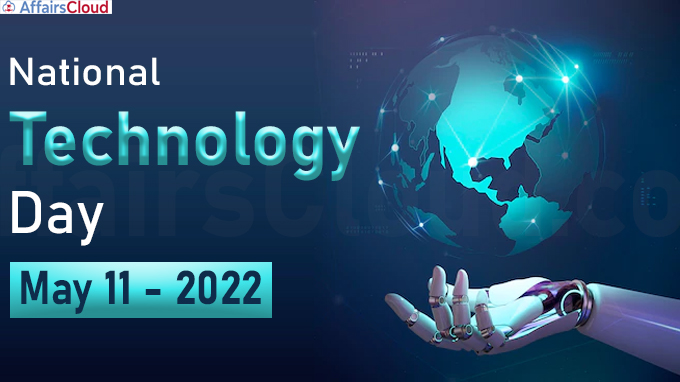
National Technology Day is annually observed across India on 11th May to commemorate the achievements of scientists, researchers, engineers and others involved in the field of science and Technology and to celebrate the major technological advancements of India.
National Technology Day commemorates the day on which India successfully conducted the Pokhran nuclear test (Pokhran II) code-named Operation Shakti on 11th May 1998.
- The theme of National Technology Day 2022 is ‘Integrated Approach in Science and Technology for Sustainable Future’.
- Technology Development Board(TDB) has stated the theme of National Technology Day 2022 is “PRAGATI: Promoting Avenues for Growth through Technological Innovations”.
The theme of the National Technology Day event is decided by the Technology Development Board(TDB), under the Department of Science and Technology(DST).
Significance:
The National Technology symbolizes India’s quest for scientific inquiry, Technology creativity and innovations and the integration of this development into national socio-economic benefits and global presence.
Background:
i.On 11th May 1998, India successfully conducted underground nuclear tests in the Pokhran range, Rajasthan.
ii.Then-Prime Minister(PM), Atal Bihari Vajpayee declared the 11th May of every year as the National Technology Day as a reminder of the anniversary of the Pokhran II tests.
iii.The first National Technology Day was observed on 11th May 1999.
History of India’s Nuclear Test:
Pokhran I:
i.On 18th May 1974, India conducted the first Nuclear Test code-named Smiling Buddha at Pokhran, Rajasthan when Indira Gandhi was the PM of India.
ii.The test was overseen by Raja Ramanna, the director of India’s premier nuclear research institute Bhabha Atomic Research Centre (BARC).
iii.This was the first confirmed nuclear test by a nation that was not a permanent member of the United Nations Security Council (UNSC).
Pokhran II:
i.On 11th May 1998, conducted three underground nuclear tests in the Pokhran range, the test was conducted with a fission device, a low yield device and a thermonuclear device.
ii.Late Dr APJ Abdul Kalam, as chief of Defence Research and Development Organisation(DRDO), supervised the Pokhran II explosion.
iii.On 13 May 1998, two additional fission devices were detonated as a part of the Pokhran-II/Operation Shakti initiative.
iv.Following this, the Indian government led by PM Atal Bihari Vajpayee declared India a nuclear state, making it the 6th country to join the ‘nuclear club’ of nations.
Events:
i.Minister of State for Defence Ajay Bhatt addressed the National Technology Day function organised by Defence Research and Development Organisation (DRDO) in New Delhi, Delhi.
ii.He released two monographs – “Endeavours in Self-reliance Defence Research (1983-2018)” authored by former Director DRDO Dr KG Narayanan and “Concepts and Practices for Cyber Security” by former Director General at DRDO Dr G Athithan.
iii.He also distributed DRDO awards for the year of 2019 to the scientific fraternity for displaying outstanding acumen in realising the technological dreams of the Nation. The category of awards included awards for Life-Time Achievement, Technology leadership, Senior Scientists Awards, Academy Excellence, Techno-Managerial, Self-Reliance and Performance Awards.
iv.During the event, A Defence Technology Spectrum was also released.




